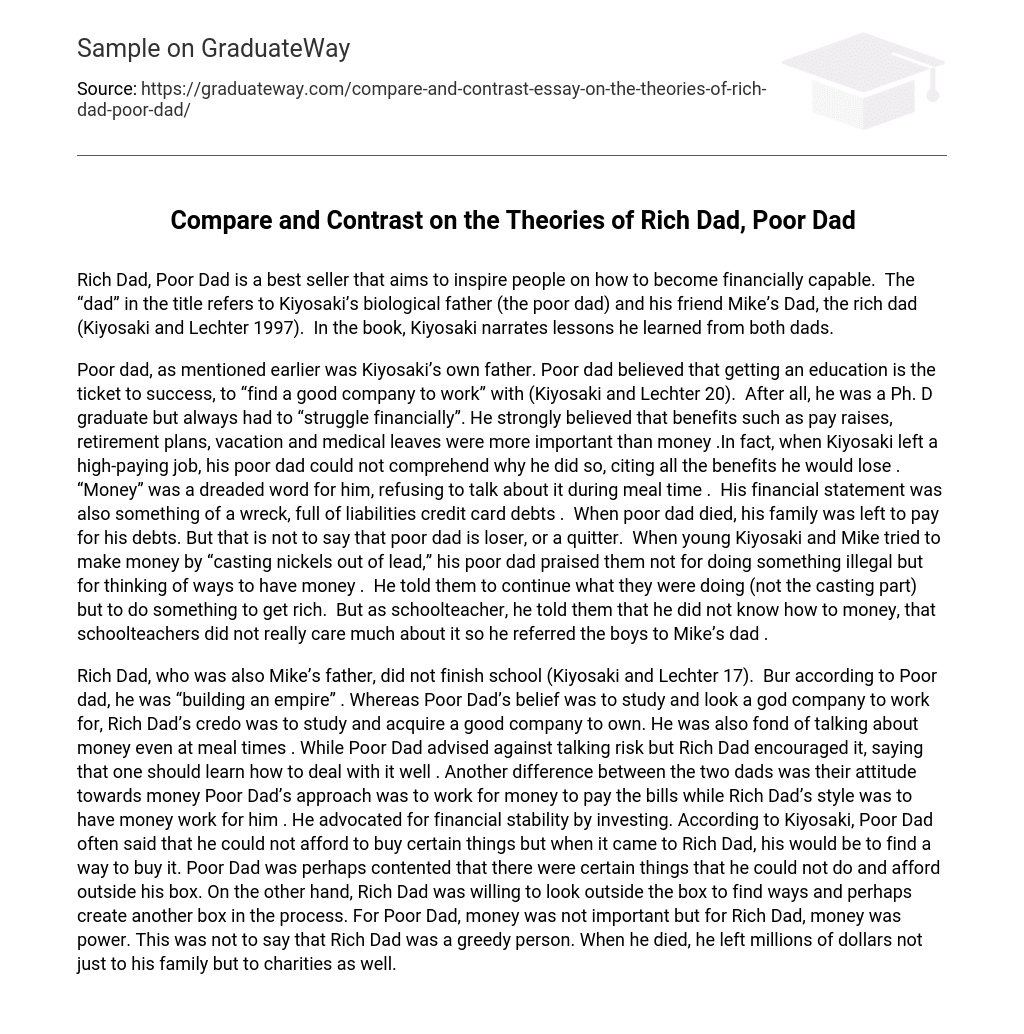Rich Dad, Poor Dad is a best-selling book that aims to inspire people on how to become financially capable. The title refers to Kiyosaki’s biological father, who was poor, and his friend Mike’s dad, who was rich. In the book, Kiyosaki narrates lessons he learned from both dads.
Poor Dad, as mentioned earlier, was Robert Kiyosaki’s own father. He believed that getting an education is the ticket to success and finding a good company to work with. Despite being a Ph.D. graduate, he always had to struggle financially. Poor Dad strongly believed that benefits such as pay raises, retirement plans, vacation and medical leaves were more important than money itself.
When Kiyosaki left a high-paying job, his poor dad couldn’t comprehend why he did so since he would lose all the benefits associated with it. The word money” was dreaded in his household and wasn’t discussed during mealtime. His financial statement was also something of a wreck, full of liabilities and credit card debts which left his family paying for them after he passed away.
However, this doesn’t mean that poor dad was a loser or quitter. When young Kiyosaki and Mike tried to make money by “casting nickels out of lead,” their poor dad praised them for thinking of ways to have money but not for doing something illegal.
Poor dad encouraged them to continue what they were doing (not the casting part) but to do something that would help them get rich in life instead. As a schoolteacher himself, he admitted not knowing how to make money since schoolteachers didn’t care much about it; thus referring the boys to Mike’s dad who had experience in business.
According to Kiyosaki and Lechter (17), Rich Dad, who was also Mike’s father, did not finish school. However, Poor Dad believed that he was “building an empire”. While Poor Dad’s belief was to study and find a good company to work for, Rich Dad’s credo was to study and acquire a good company to own. He even talked about money during meal times. Poor Dad advised against taking risks while Rich Dad encouraged it, saying that one should learn how to deal with it well. Another difference between the two dads was their attitude towards money; Poor Dad worked for money to pay the bills while Rich Dad had his money work for him by advocating financial stability through investing.
Kiyosaki notes that when it came to buying certain things, Poor Dad often said he couldn’t afford them whereas Rich Dad would find a way to buy them. For Poor dad, there were certain things outside his box that he couldn’t do or afford but for Rich dad, he looked outside the box and found ways – perhaps even creating another box in the process.
While money wasn’t important for poor dad; it meant power for rich dad but this didn’t mean that rich dad was greedy as when he died, he left millions of dollars not just for his family but also charities.
In these times of economic crisis, people can benefit from the lessons of Rich Dad and Poor Dad. From Poor Dad, we learn the importance of education. Although it may sound like a cliché, having an education is truly valuable. It greatly increases one’s chances of finding a decent job with good pay and benefits.
Rich Dad, who did not finish school himself, also stressed the importance of education but added another important lesson – to let money work for you through investing. While the world is plagued by financial difficulties, now is actually a great time to invest while prices are low. As they say: buy low and sell high.
The key to successful investing lies in education – learning about how the investment market works and observing its trends carefully. Investing involves risks but as Rich Dad said: managing risk well is crucial.
Whether we’re like Poor Dad who avoids money matters or Rich Dad who seizes opportunities for wealth creation, now is an opportune moment to assess our assets and liabilities and strive towards financial independence without being burdened by mortgages or unpaid credit card bills.
Works Cited
- Kiyosaki, Robert and Sharon Lechter. Rich Dad, Poor Dad.” New York: Warner Books, 1997.





